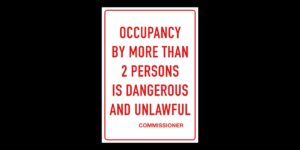When Social Anxiety Tries to Rule Your Life
Joshua Henderson
According to the Anxiety and Depression Association of America (ADAA), fifteen million Americans suffer from social anxiety. Does the story below sound familiar to you?
Susan’s stomach twisted as she drove to the school. This is ridiculous, she thought. I’m only attending my son’s band concert, which he has worked so hard for every day. I’m not the one who is going tobe sitting on stage. Her stomach twisted even more as a wave of nausea hit her. She’d been dreading this night. The band consisted of forty students, and tonight each student’s family would attend along with the school staff and administration – so many people.
By the time Susan and her son reached the auditorium, she was sweating through her dress. She fought hard to keep her voice steady when someone asked her a question. Was it really this loud in the auditorium? As she sat down in her seat surrounded by excited families, she felt like she couldn’t breathe. If she didn’t gain control of this, she would go into a full-blown panic attack.
What causes social anxiety?
For many people, social anxiety begins during the teenage years, although it may be mislabeled as shyness. Shyness is a trait that most people have on some level. It is the uncomfortable sensation you experience outside of your comfort zone, especially when talking with strangers. Usually, shyness goes away once you have reached a comfortable level with those strangers or in a situation.
Shyness is awkward, but it is not a phobia. Social anxiety heightens this uneasiness into a gripping fear. This fear isolates and keeps you from moving forward in life.
You may have developed social anxiety for several reasons over the years. If you were raised by someone who exhibited social anxiety behaviors, you might have noticed those behaviors or inherited a genetic trait. This is especially true if your parent or guardian with social anxiety raised you in an isolated environment.
Untrue belief systems based on past experiences can also cause social anxiety. For example, if you were bullied as a child for your appearance or behavior, this trauma could have created an inner belief that what the bully said is true, even though what the bully tormented you with was a lie. The words gave some confirmation, and a belief took root. Belief systems based on trauma are challenging (but not impossible) to overcome.
Not meeting these societal expectations can make a person with social anxiety feel like an outcast. This feeling of unacceptance can result in fear of being judged. Everyone wants to belong to something, yet even as adults, we face dislike and jealousy.
But to someone with social anxiety, this worry can be imagined. They might imagine what other people think about them or assume another’s actions have to do with them. Either way, these thought processes lead to anxiety.
Sometimes, social anxiety is due to brain structure. The amygdala, a small portion of the brain that controls the fight-or-flight response, goes into hyperdrive for someone experiencing social anxiety. The amygdala views the social event or gathering as a threat. Something as harmless as shopping in a grocery store can cause immense stress and physical pain.
Do these signs of social anxiety sound familiar?
Social anxiety symptoms can affect emotions and mood, and physically manifest in ailments.
Emotional Symptoms
As fear strengthens, social anxiety can cause someone’s emotions to run from irritable to apprehensive to anxious. While anticipating the event, thoughts can plague you. Your mind might create imaginary scenarios or make you believe that the other people attending the event will look at you or talk about you. You might be afraid that you will do or say something to embarrass yourself or others. Your anxious thoughts lead to anxious emotions.
Physical Symptoms
The mind and body have a powerful connection. Thoughts lead to emotions, which in turn create behaviors and physical reactions. The feelings experienced with social anxiety can cause underlying anxiety and stress. This combination can bring rapid heartbeat, lightheadedness, dizziness, headaches, and trembling.
 In many cases, people with social anxiety have sudden gastrointestinal issues, including stomach cramps, nausea, diarrhea, and heartburn or acid reflux. Excessive sweating and shortness of breath are common.
In many cases, people with social anxiety have sudden gastrointestinal issues, including stomach cramps, nausea, diarrhea, and heartburn or acid reflux. Excessive sweating and shortness of breath are common.
In severe cases, social anxiety can bring panic attacks. Panic attacks not only result in being short of breath, increased heart rate and blood pressure, but also chest pains that mimic a heart attack. The fear of actually having a heart attack makes panic attacks worse. If you are experiencing anxiety or panic attacks, have your primary care physician rule out any heart issues. A licensed psychologist can determine if your social anxiety leads to panic attacks.
Social Symptoms
Social anxiety can cause problems in relationships and career opportunities. It can keep you from stepping outside of your comfort zone. The thought of going on a date, attending live class sessions in person, worshipping in church, or joining friends for a lunch date is almost terrifying.
These fears can keep you stuck, feeling like you have no choice but to stay isolated. Social anxiety can keep you from gaining a degree, acquiring your dream job, finding the right spouse, or making new friends.
If you feel like social anxiety is taking its toll on your life, it is time to reach out for help.
Is it possible to overcome social anxiety?
You can overcome social anxiety. You are not stuck. God created you to be with others and serve people in your community. Not for you to hide and isolate yourself from the world. There are strategies you can try today.
In a baby-step approach, you might want to start acclimating yourself outside your comfort zone. Choose a small gathering of people, perhaps a Bible study, and permit yourself to attend. Find one online if you do not think you are ready for a face-to-face group.
Slowly work your way up to shopping in small stores and visiting museums or zoos on less busy days. Eventually, you will find it easier to handle small gatherings. Take your time and push yourself a little more on each excursion.
Take note of your thoughts while in these gatherings. Are you concerned about what others are thinking or doing? Or are you worried about embarrassing yourself? Maybe both? Journal these thoughts so you can learn to identify them. A counselor can help you identify these thought patterns and shift your perspective to change your emotions from negative to positive.
Another strategy that people find helpful is public speaking. Many colleges and universities require students to take public speaking (also known as speech) classes. In these classes, you learn the different types of communication and how to give speeches.
Learning to get outside of your own head during a presentation can help immensely in dispelling fear and anxiety. The more you practice, the easier it will become to stand in front of others. Speak with a counselor about your level of social anxiety and if this would be a good technique for you to try.
The stress and anxiety from social situations can leave you tense and physically ill. Relaxation techniques like mindfulness, prayer, breathing exercises, and positive visualization can be helpful. Controlling your breath as you move through the breathing exercises releases tension in the muscles and brings calmness to your mind.
Next Steps
Seeking help from a mental health specialist for anxiety will introduce you to new approaches like talk therapy and cognitive behavioral therapy (CBT), both efficient methods in battling the effects of anxiety.
Social anxiety is treatable. Find a licensed therapist specializing in anxiety disorders to learn more about the different psychological approaches to overcoming social anxiety. You were meant for community, and you need others for fellowship. It is time to beat social anxiety and get back to living your life.
“Mountain River”, Courtesy of Sonyuser, Pixabay.com, CC0 License






